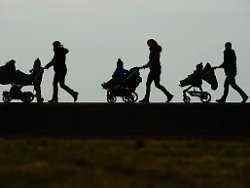Right to parental and care leave
The CDU leadership wants to attract women with further reforms
07/11/2022, 5:30 p.m
The CDU has been under pressure for decades when it comes to the low proportion of women in its ranks. After the push for a women’s quota, the party leadership wants to create a right to “political parental and care leave” in party offices, as well as one that affects attendance at meetings.
The CDU wants to get more women and parents interested in party work through reforms. The federal executive board decided to submit a motion at the party conference in September to create a “right to political parental and care leave,” as CDU General Secretary Mario Czaja said. “We want you to be able to leave your office for up to a year if you have taken on responsibility for children or care.”
The aim is to open up to new members and adapt to a “new era,” said Czaja. This also includes a “right to hybrid meetings from the district association level” and “fixed start and end times”. This is “important for planning voluntary work, but also for planning family and work”.
The party conference on September 9th and 10th will also deal with the introduction of a women’s quota, which has been discussed for years. In June, CDU leader Friedrich Merz proposed gradually introducing a 50 percent women’s quota for party executives from the district level by 2025. It should then be limited to five years.
The party tends to be old and male
The women’s quota has been controversial in the CDU for years. A gradual quota up to 2025 had actually already been decided in 2020 under pressure from the then CDU leader Annegret Kramp-Karrenbauer by the party leadership. However, due to the corona pandemic, the application was never submitted to a federal party conference for a vote.
The proportion of women in the CDU has hardly changed since the 1990s. In the Bundestag, the Union currently has a proportion of women of 23.5 percent, among party members it is 26.6 percent. The age structure is also considered a problem: the average age of the members is 60.8 years.
